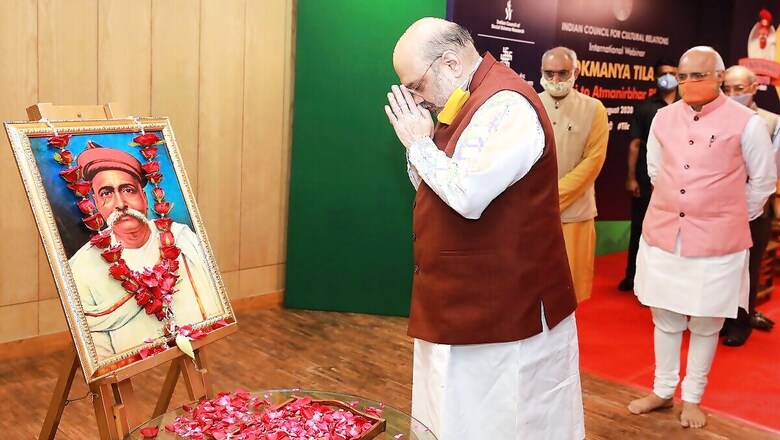
views
Union Home Minister Amit Shah on Saturday said Lokmanya Bal Gangadhar Tilak's belief in Indian language and culture is reflected in the New Education Policy recently released by the Narendra Modi government.
Inaugurating a two-day international webinar on 'Lokmanya Tilak - Swaraj to Self-reliant India', he also said Tilak's ideas are being promoted through Prime Minister Modi's vision of a 'New India' and 'Atmanirbhar Bharat' (self-reliant India).
The home minister said Tilak's idea of India as a nation, Indian culture and Indian customs are equally relevant today.
"Lokmanya Tilak's belief in Indian language and Indian culture is reflected in the New Education Policy of the government of Prime Minister Narendra Modi.
"Tilak's ideas are being promoted through the prime minister's vision of a New India and Atmanirbhar Bharat," he said.
New Education Policy, 2020, was approved by the Union Cabinet on July 29 and it proposes sweeping changes in school and higher education.
Teaching up to class 5 in mother tongue or regional language, lowering the stakes of board exams, a single regulator for higher education institutions except for law and medical colleges and common entrance tests for universities are part of the reforms in the NEP.
The webinar was organised here by the Indian Council for Cultural Relations on the 100th death anniversary of Lokmanya Bal Gangadhar Tilak.
Referring to Tilak's famous quote that the foundation of true nationhood is laid on the foundations of culture and traditions, Shah said, "Any reform which undermines or disrespects our past cannot help in realising true nationhood."
The home minister said Tilak played a key role in the making of the Indian Independence movement complete in letter and spirit and made an unparalleled contribution to the freedom movement.
The slogan 'Swaraj is my birthright and I shall have it' given by Tilak, will always be written in golden letters in the history of the independence movement, he said.
"This slogan may seem natural to utter in present times, but in the 19th century, very few people could have dared of uttering it and sacrificing their life and working for it to make it turn into reality."
The home minister said this slogan of Tilak served to awaken the Indian society and convert the freedom struggle into a mass movement, due to which he came to be known as Lokmanya Tilak.
The home minister said despite being an eloquent orator, thinker, philosopher, established writer and social reformer, Tilak was rooted to the ground.
If one wants to know the glorious history of India and Indian culture, then Tilak's writings will have to be understood, Shah said, adding reading his literary works will give the youth knowledge about his great personality of Tilak.
"By taking inspiration from him, the youth will be able to attain new heights in their lives." Shah emphasised that in the name of social and political reform "we cannot afford to adopt British models for our institutions".
Tilak wanted to inculcate the love for the nation amongst the people on the basis of pride for Indian culture. In this context, he set up gymnasiums, arenas, anti-cow slaughter institutions, he said.
The home minister said Tilak was a strong opponent of untouchability and he had launched a movement to unite the society divided in caste and sects.
Referring to Tilak's significant contribution to connect the working class to the national movement, Shah said Tilak had started celebrating Shivaji Jayanti and Ganesh Utsav to connect the people with the freedom struggle, which changed the direction of the Independence movement.















Comments
0 comment